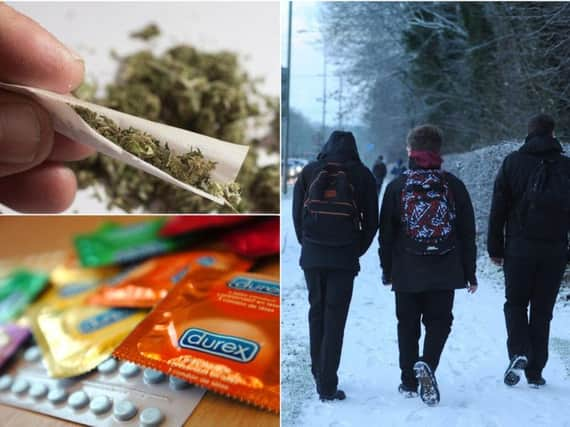Shocking figures reveal Calderdale children aged 11 have had sex and school pupils have taken drugs


The findings have been revealed in an e-health survey aiming to highlight and improve the health and wellbeing of Calderdale’s young people.
Year seven and Year ten pupils in Calderdale, which is around 4,000 children, took part in the survey.
Advertisement
Hide AdAdvertisement
Hide AdIn the report that was discussed by councillors on the Children's and Young People's scrutiny board it revealed around one in ten of the secondary school pupils had had sex, seven out of ten using contraception, the figure increasing from two per cent of year seven students to 17 per cent of year ten students.
While most had sex for the first time aged 14 or older, one in five girls reported having sex for the first time at 13.
And, said the report, it was concerning that of those who had had sex, one in seven boys reported being 11 years old or younger when they did – given the UK age of consent is 16 and children under 13 can never give consent legally.
Councillors asked questions about a range of these, including healthy eating, use of social media, gang culture – officers said this was more of an issue in neighbouring Bradford and Kirklees than Calderdale – and the age some of them started having sex.
Advertisement
Hide AdAdvertisement
Hide AdThe council’s Director of Children’s and Young People’s Services, Julie Jenkins, pointed out to councillors that they needed to look at the results carefully to see the whole picture.In the case of one in ten responding that they had had sex they were very much in the minority – 90 per cent had not, she said.
The surveys have been taken in secondary schools for almost a decade now – using an anonymous online survey, students answer questions relating to a wide range of health and wellbeing issues.
Questions the survey asks cover a wide range of topics from the young people’s sexual orientation to their general health, diet and exercise.
Children were also quizzed about risk-taking behaviour including asking them about smoking, alcohol, drugs and their sexual health.
Advertisement
Hide AdAdvertisement
Hide AdAround one in ten of the secondary students, a figure increasing significantly the older pupils were, had tried cannabis while a quarter of year ten pupils had been offered drugs other than that.Sex also featured in questions about young people’s online habits, with 12 per cent being involved in “sexting” – sharing sexual, naked or semi-naked images or videos or sending sexually explicit messages.
Possession and sharing such images is illegal under the age of 18, but only a third of the young people knew that.
One in three of the young people said they had seriously thought about harming themselves and the same number said they had low self-esteem.
The survey results allow schools and services to hear what young people were saying about their own health and wellbeing and do something about it where they uncover issues.
Advertisement
Hide AdAdvertisement
Hide AdSchools are given copies of their results and once they have them the council’s Public Health in Schools co-ordinator Helen Saunders supports them to develop a bespoke health and wellbeing action plan to tackle any concerns.
What else did the survey say?
Half of children ate breakfast daily, three quarters of them brushed their teeth twice or more a day and a fifth achieved an hour of physical activity daily showed the report.
Questions the survey asked and details whether they eat healthy foods, how they travel to school, how they use social media or watch television, and for how long, the state of their mental health including their approach to exams, bullying and their home life.
Possible radicalisation is another online issue but more than 90 per cent of the pupils said they had never been encouraged to adopt views some would consider extremist.Caption – pic supplied to us for use
